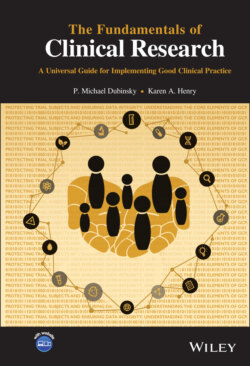Читать книгу The Fundamentals of Clinical Research - P. Michael Dubinsky - Страница 94
7.2.1.5 The Regulatory Authority
ОглавлениеThe regulatory authority is a public authority or government agency charged with overseeing clinical investigations that involve unapproved medicinal products. By definition, the Regulatory Authority is:
A body having the power to regulate. In the ICH GCP guidance the expression “Regulatory Authorities” includes the authorities that review submitted clinical data and those that conduct inspections. These bodies are sometimes referred to as competent authorities. (ICH E6(R2) 1.49)
A regulatory authority is a public authority or government agency. There may be an agency named specifically to oversee the safety, effectiveness, quality, and security of medicinal products, such as the Food and Drug Administration (FDA) in the United States of America and the Medicines and Healthcare Products Regulatory Agency (MHRA) in the United Kingdom, or the function may fall under the general authority of, for example, a country’s Ministry of Health.
The authority or authorities make rules to govern the activities for drug development, that is, manufacturing of the medicinal product, animal testing, and clinical testing. For clinical testing specifically, there are rules that govern the activities of the Sponsor, Clinical Investigator, and the IRB. Each of the clinical testing players has rules to follow and these rules are typically called “responsibilities.” The Sponsor submits the data from clinical trials as part of an application for approval for marketing the test product. The Regulatory Authority reviews the application to assess a product’s safety and efficacy, will conduct inspections to ensure that trials were conducted according to GCP and the applicable regulatory requirements, and will consider other factors prior to granting approval.
